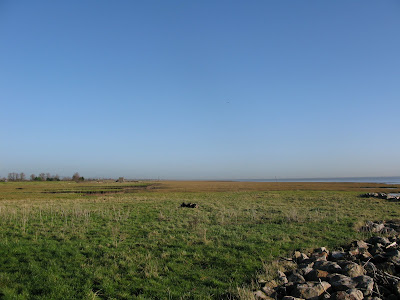Cardiff: Tongwynlais ST1482 and The Wenallt ST1483/1583 [Predominantly broadleaved woodland, naturally occurring beech with oak, ash, hawthorn, hazel and alder. Excellent for migrant & resident woodland species]
Southview, Tongwynlais
Beechwoods above South View
The Wenallt ridge in spring
Cardiff: Rumney Great Wharf ST2377 & ST2478 [Coastal saltmarsh, grassland and mudflats. The best place for waders & wildfowl in the Cardiff area. Excellent for viewing passage migration. Best in autumn.]
(Wharf = Warth or Warod from the old English)
Rumney Great Wharf [RGW] looking towards Cardiff
RGW looking east towards Sluice Farm, Gwent
RGW spartina grass and beyond the mudflats. Covered by the sea at hightides
Cardiff Bay Wetlands Reserve, Barrage & Mudflats ST1873, ST1972/73 [Freshwater lagoon, created by the barrage across the mouth of the Taff & Ely rivers. The reserve has extensive reedbeds with sallow & alder fringes. The barrage has a stone defensive wall with grassland. The bay lagoon is good for wildfowl, gulls & hirundines/swifts and the reserve for aquatic avifauna. The coastal mudflats for gull & wader passage].
CBWR showing reeds and scrub areas
Cardiff Bay looking towards the barrageCardiff Bay barrage showing mudflats and Bristol channel towards Flat Holm
Cardiff Heliport: ST2175 [Coastal grassland with scrub. The best seawatching site in Cardiff. Good for passage migration in both spring & especially in autumn. Attracts passerines to the coastal path between the heliport and the water treatment works further east. The bay at low tide is good for wildfowl, waders & gulls].
Cardiff Heliport at hightide showing scrubby area on top of the 'tump'.
Section of the tump showing area of trees and scrub, good for migrants
Area of grassland that forms part of the heliport and the coastal path & scrub.
Flat Holm ST2265 is a small island in the Bristol Channel which is officially part of Cardiff. [Coastal maritime habitat with grassland & elder scrub. Huge gull colony. Good for passage migration. Unfortunately under recorded.]
Flat Holm, The Island of Echni or Braden Relice (Anglo Saxon Chronicles). flattr holm (Norse)
Section of the tump showing area of trees and scrub, good for migrants
Area of grassland that forms part of the heliport and the coastal path & scrub.
Flat Holm ST2265 is a small island in the Bristol Channel which is officially part of Cardiff. [Coastal maritime habitat with grassland & elder scrub. Huge gull colony. Good for passage migration. Unfortunately under recorded.]
Flat Holm, The Island of Echni or Braden Relice (Anglo Saxon Chronicles). flattr holm (Norse)
The lighthouse at Lighthouse Point. Good for migrants early morning and seawatching
The farmhouse which is used for accommodation and cooking meals
Inland Cardiff waters, good for wildfowl and gulls, also hirundines and occasional waders at the reservoirs.
Lisvane Reservoir: excellent for Wildfowl & Gulls
Roath Park Lake: good for wildfowl & gulls, esp. in autumn/winter
Roath Park Lake c1900 showing the boat stage & fields where Lake Road West is today.
Riparian woodland along side River Rhymney: mature oak, beech, ash, silver birch & alder with wet meadow. Excellent for open woodland species and river specialists.
Section of oak woodland at Coedcae-bach (Cefn Mably Parkland) at ST2283
The River Rhymney: good for wildfowl, waders & gulls, especially in autumn and winter.
The Rhymney from Lamby Way bridge looking north
Lamby = Langby or long village (Scandinavian)
The farmhouse which is used for accommodation and cooking meals
Inland Cardiff waters, good for wildfowl and gulls, also hirundines and occasional waders at the reservoirs.
Lisvane Reservoir: excellent for Wildfowl & Gulls
Roath Park Lake: good for wildfowl & gulls, esp. in autumn/winter
Roath Park Lake c1900 showing the boat stage & fields where Lake Road West is today.
Riparian woodland along side River Rhymney: mature oak, beech, ash, silver birch & alder with wet meadow. Excellent for open woodland species and river specialists.
Section of oak woodland at Coedcae-bach (Cefn Mably Parkland) at ST2283
The River Rhymney: good for wildfowl, waders & gulls, especially in autumn and winter.
The Rhymney from Lamby Way bridge looking north
Lamby = Langby or long village (Scandinavian)



















